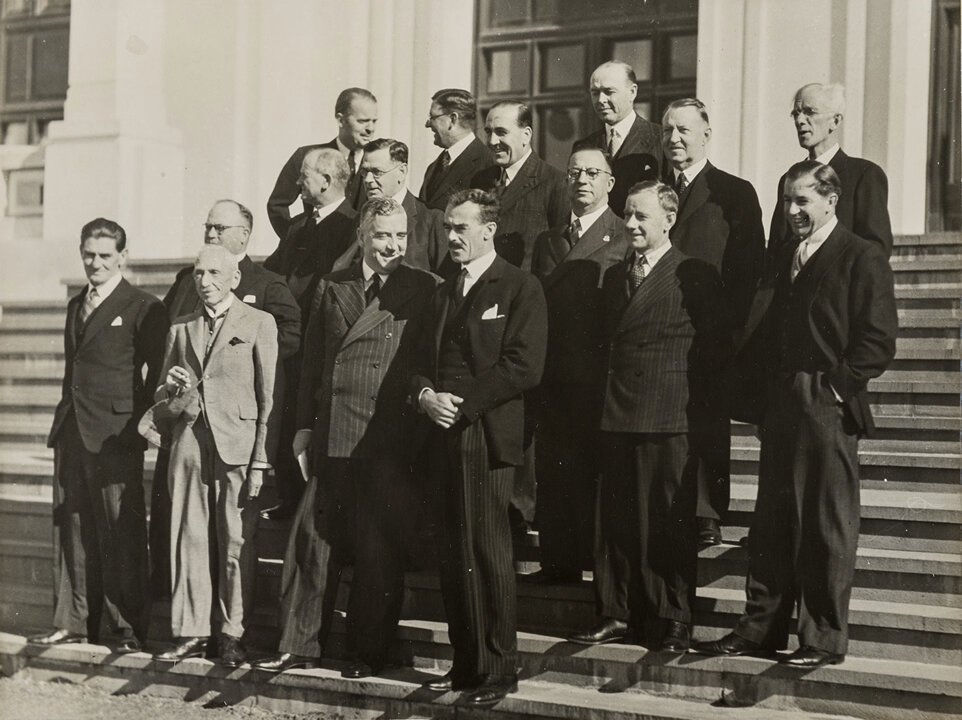On this day, 29 August 1941, Robert Menzies decided to ‘jump before he was pushed’ and resign the Prime Ministership amidst Coalition infighting and intrigue aimed at displacing him. He said that he hoped that his departure would create ‘real prospects of unity in the ranks of the Government parties’, but the divisions that led to his resignation proved too big to be overcome. Country Party Leader Arthur Fadden formed a new Coalition Government, but it would last little over a month before two crucial Independents switched their support to John Curtin and the Labor Party. Menzies had been Prime Minister for over two years, helping to lay the foundation for Australia’s successful war effort, however he received little credit for this and at the time of his resignation his political resurrection seemed unlikely, perhaps even unthinkable.
The Coalition had been fractured ever since Menzies had become Prime Minister in April 1939, after the death of the tremendously popular Joseph Lyons. Just prior, Menzies had resigned from the Lyons Ministry over a point of principle, an act which Dame Enid Lyons would later claim contributed to her husband’s death. Enmity from this action lingered within the United Australia Party, but it would be completely overshadowed by the animosity of Country Party Leader Earle Page. The latter launched a visceral attack on Menzies claiming that since he had not served in World War One, Menzies had no right to be a wartime leader in the conflict which current global events seemed to presage. As a consequence, Menzies was forced to form an all UAP Cabinet.
Despite the ominous circumstances, this Cabinet would function remarkably well performing the vital task of getting Australia on a war-footing, as in line with Britain Menzies declared war on Nazi Germany in September. Tragically however, the Government would be irreparably damaged by the Canberra Air Disaster in which three Cabinet members; James Fairbairn, Geoffrey Street, and Henry Gullet, lost their lives in August 1940. Soon afterwards Menzies faced his first election as leader, suffering setbacks which left the Government precariously reliant on the votes of two Independents. Since virtually the outbreak of war, Menzies had made overtures to the Labor Party to form a cross-party National Government for the duration of hostilities, as had occurred in the United Kingdom, but Labor had consistently refused.
Menzies’s main focus as Prime Minister was to ensure that the Allied Forces had enough resources in the Pacific to combat Japan if she entered the War on the side of the Axis Powers. It was for this reason that he travelled to England in early 1941, risking both physical and political dangers to negotiate with Winston Churchill. He found Churchill preoccupied with the Battle of Britain and what seemed like a very real prospect of German invasion. Menzies was admitted to the British War Cabinet in which the two Prime Ministers had a series of intense clashes, but ultimately Menzies was unsuccessful in reallocating the Allies’ priorities.
Menzies had put his country’s interests before his own in taking the trip. It was inevitable that given existing dissatisfaction with his leadership and his precarious position in Parliament, if he came back empty-handed his Prime Ministership would be in jeopardy. He was quietly informed that his political grave was being dug, and when he returned he complained of the absurdity of having to ‘play politics’ at a time when Australia’s survival may very well have been at stake.
Circumstances were certainly not kind, and the political manoeuvring in the background was arguably motivated more by personal interest than the national interest, but Menzies must shoulder some of the blame for the way in which his first stint in the top job ultimately combusted. He was known to be arrogant with his colleagues and even to some degree with the electorate, and he often delivered cutting criticisms with a complete lack of tact. Opposition Leader John Curtin, privately Menzies’s friend, said that his opponent was not good at ‘handling his men’. The press also disliked Menzies, even outlets that were predisposed to support the UAP.
Menzies’s resignation would help to reshape the man and make possible his tremendous future success. It was arguably the first real setback in what had been a charmed life of advancement and accomplishment from humble beginnings in Jeparit. Menzies learned a harsh lesson in people skills, and the time away gave him the chance to philosophise about where the nation should go after the War in the form of the Forgotten People broadcasts. These would form the blueprint for the values underlying his new Liberal Party and his future Government. Curtin could claim credit for winning the War, but Menzies would ultimately win the Peace.
Further Reading:
Anne Henderson, Menzies at War (NewSouth Publishing, 2014).
A.W. Martin, Robert Menzies, A Life: Volume 1 1894-1943 (Melbourne University Press, 1993).
Robert Menzies, Dark and Hurrying Days: Menzies’ 1941 Diary, edited by A.W. Martin and Patsy Hardy (National Library of Australia, 1993).
Sign up to our newsletter
Sign up for our monthly newsletter to hear the latest news and receive information about upcoming events.


